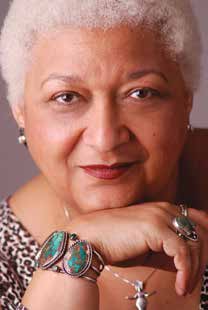
By Jewelle Gomez–
So, full disclosure of my guilty pleasure: I watch mysteries and police shows. I know they are not at all like real life police who are terribly dangerous to civilians and women of color. Maybe I’m sentimental because my great uncle was one of the first men of color on the Boston police force; and even then, we all knew the sinkhole he was dropping into. Maybe it’s the way each story wraps things up that appeals to me. I don’t know. You’d have to ask Maria, my long-term therapist, but she died two decades ago, carrying my secrets to her grave.
All that is preface to a discussion of two police shows that feature lesbians. Tommy only had one season and starred Edie Falco as the first female police chief of Los Angeles—and an out lesbian. I never caught her on The Sopranos (I’m not so much a mob fan), but I’d watch Falco read the proverbial phone book (if anyone remembers them). She’s got those big, round eyes you want her to turn toward you; and she was impressive in a suit and a uniform.
Tommy wasn’t written well enough, and other than Falco, the casting didn’t seem to gel—except Thomas Sadoski, another actor who is mesmerizing. The series aired in 2020 as the pandemic shaped everything we thought and did. I recorded the series and saved it until now to watch. It was eerie listening to the hushed tones and platitudes that automobile ads used then. “Together we can do this … our spirit is what unites us … .” Guess they didn’t see the Proud Boys coming.
But if anyone was going to portray a lesbian police chief, I’d pick Falco. Anything a therapist ever knew about her is just behind her eyes and ripples through her body. When I see lesbians on television, that’s what I look for: a full person.


The other show is Deadloch, which takes place in a fictional town in not fictional Tasmania (home of the genius, lesbian social commentator /comedian Hannah Gadsby). The town seems to have attracted an unusual number of lesbians—sort of like the Isle of Lesbos without the revered poet. It’s a “black” comedy in which the police chief, a lesbian played by Kate Box, has sworn off murder cases because the work upsets her sensitive lover. Then arrives the murders; first one, followed by two, and … well, I think the final number was twelve men.
The men of the town begin to think it’s a woman delivering vengeance to abusers. It’s like the Salem witch hunts in how easy it is to make suspect every word or look delivered by a woman. And, of course, the townsfolk do get around to blaming it on the overabundance of lesbians in the little town.
The police detective is sent a partner, played by Madeleine Sami, who is reeling from a trauma in her earlier posting. She is so unhinged it’s cringeworthy. She drinks, swears, doesn’t wash, and is condescending
to everyone. But this is down under, so pretty much everyone is profane. That her character is Indigenous is upsetting—although there are enough other significant Aboriginal characters to offset this imbalance. If you stick with the series for three episodes, though, Sami’s character (who is straight, so far) begins to reveal and redeem herself, turning out to be the perfect foil for the cautious lesbian detective.
Back in the day when TV detectives Cagney and Lacey broke the boundaries, executives were so afraid the audience would perceive one of them as a lesbian that the actor in question was recast after the pilot show. Then, by the time we get to Rizzoli & Isles, producers use the titillation of lesbians to spike ratings by throwing the two police friends in (innocent) bed scenes as often as they can. They became my fave faux lesbians.
I’m sorry Tommy didn’t get a chance to have good writing and a second season; I’ll have to get my Falco fix elsewhere—maybe by rewatching Nurse Jackie. But Deadloch is streaming and promises a season two. It gives the phrase “down under” a delicious new connotation.
Jewelle Gomez is a lesbian/feminist activist, novelist, poet, and playwright. She’s written for “The Advocate,” “Ms. Magazine,” “Black Scholar,” “The San Francisco Chronicle,” “The New York Times,” and “The Village Voice.” Follow her on Instagram and Twitter @VampyreVamp
Leave Signs
Published on August 8, 2024
Recent Comments